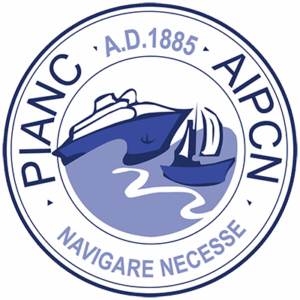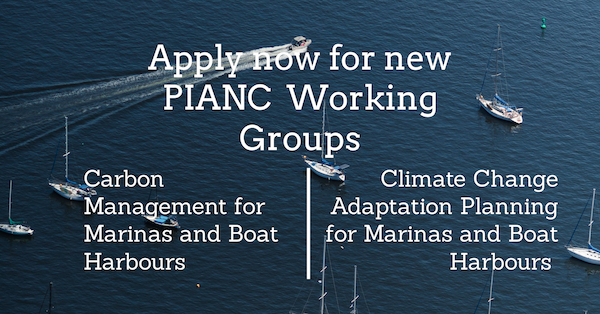PIANC A&NZ Members are invited to apply for participation in two new PIANC International Recreational Commission Working Groups. Many of our members are currently active on a number of PIANC Working Groups and they produce significant outcomes that benefit maritime matters in our region.
PIANC’s objective under its Declaration of Climate Change is to seek to continue to support ports, harbours, marinas and inland waterways by facilitating knowledge sharing and preparing practical technical guidance to help them manage the climate change challenge through effective risk management.
These two new RecCom Working groups seek to target specific guidance and requirements for marinas and boat harbours related to climate change.
RecCom WG244
Climate Change Adaptation Planning for Marinas and Boat Harbours – see Terms of Reference.
Objectives: This working group report will target specific conditions of marinas and recreational navigation infrastructure, to develop guidance for climate change planning and adaptation. It will provide practical guidance for implementation of best practices for incorporating resilience and adaptation measures in the redevelopment of existing infrastructure and development of new marinas.
By developing guidance for climate adaptation of marinas and recreational boating infrastructure, this report should help owners manage climate physical risks, encourage proactive investment in resilient infrastructure, and promote transparency in climate risk disclosure to improve investment and regulatory conditions, ultimately sustaining marina businesses.
RecCom WG245
Carbon Management for Marinas and Boat Harbours – see Terms of Reference.
Objectives: This Working Group report will target specific guidance and requirements for marinas and boat harbours related to climate change mitigation (carbon management and decarbonisation). More targeted guidance could focus on the following issues:
- carbon accounting practices for marinas and boat harbours (sources, guidance, standards) including a framework for typical scope 1 (direct fuel consumption), scope 2 (energy sources and consumption) and scope 3 (ancillary activities not under the direct control of the marina that produce carbon emissions such as supply chains and the operation of customer vessels) that are relevant to marina infrastructure and operations
- energy conservation and efficiency opportunities
- alternative energy generation and self-generation
- infrastructure and equipment to support alternative fuels for recreational vessels
- building and material specifications
- transport, transit, access and vehicle fleets
- blue carbon capture and building ecosystem services
- requirements for maintenance and operation of machinery and vessels (including vessel speeds)
- water accounting, efficiency and re-use
- compensation of carbon generation through approved projects by the Kyoto protocol.
Leading practice can also be documented and supported by representative worldwide examples and case studies.
REPRESENT OUR REGION
If you would like to represent the Australian & New Zealand National Section of PIANC on either of these Working Groups please apply to the A&NZ Board.
Please advise if you qualify as a Young Professional (YP – 40 years or younger) as there are two positions available in each Working Group, one of which is for a YP.
How to Apply:
Please forward your application before COB Friday 24 Feb 2023 to:
Greg Britton, (Technical Commission Lead A&NZ) E: greg.britton@rhdhv.com
Your application should include a detailed CV/Resume with a short covering letter outlining:
1. Your experience in the particular technical field;
2. Why the WG is relevant for the Australian / NZ content and the direct benefits of participation;
3. A commitment that you will prepare (for distribution to all members) a short report providing an overview & outcomes of the WG etc;
4. Whether or not you are seeking to access Travel Assistance Policy (TAP )funding; and
5. Whether you qualify as a Young Professional.
Eligibility:
Please note that Working Group Members need to be Individual Members of PIANC, working for a Corporate Member or Platinum Partner, be an invited expert or a be a member of a Sister Organisation.
Process:
A Selection Committee will review all nominations received and make a final recommendation to the PIANC A&NZ Chair.
Responsibilities:
Please be aware that membership of a Working Group does require your active participation. This includes attending Working Group meetings (pre-Covid -19 this was usually at international locations) or as a ‘Corresponding Member’ if you do not want to undertake the normal travel requirements of full membership. If you are expert in the field and would like to influence the outcome of the Working Group we encourage you to participate as fully as you are able.
Costs:
All costs associated with membership must be borne by either yourself or your employer, however PIANC Australia & New Zealand has a Travel Assistance Policy to partially assist with travel & attendance at Working Group meetings, in order to promote Australian and New Zealand technical input into these important WG activities.
Under the PIANC A&NZ Travel Assistance Policy (TAP), up to $2,000 funds may be payable post travel upon the successful completion of a WG Summary Report and production of relevant travel receipts.
All nominations must be received no later than 24 Feb 2023

